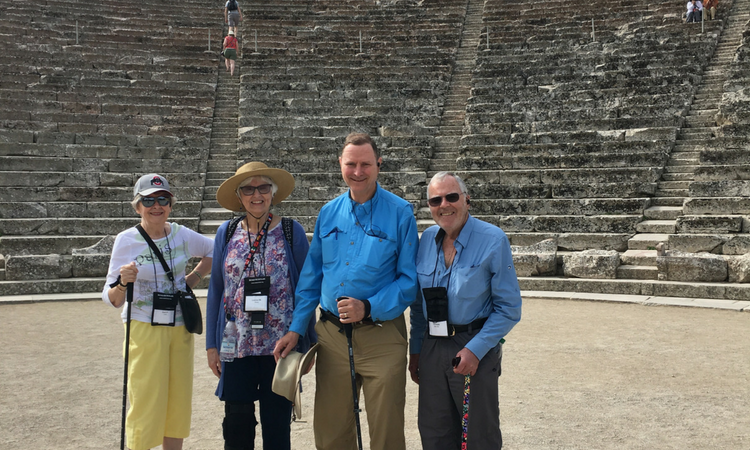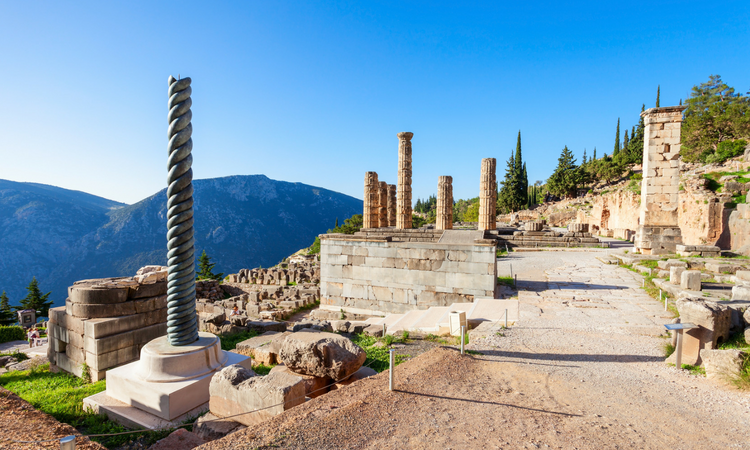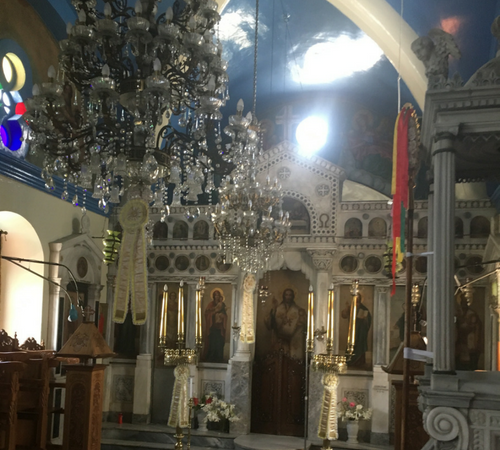
With some fellow Road Scholars at the amphitheater of Epidaurus, the center of the Greek healing arts.
Still Jet Lagged After All These Days.
Finally. This morning was better. I didn’t wake up until 4 a.m. Rather than-boing!-bolt upright, bright eyed, bushy tailed, and ready to be “up and at ’em” at 2:30. Yuck.
So, rather than lying futilely in bed, I got up at 4:30, watched some of Sense and Sensibility while I made the elliptical go ’round, showered, and had a bite of breakfast. And then crawled back in bed for an 8:30 nap. This, needless to say, this is no way to run a railroad.
I don’t, for the life of me, see how my sister and her husband do it. World travelers par excellence. I almost never know, literally, where in the world they’re at. Home an extended layover; jet lag as a life style.
And, when we talked about my Greece trip the other day, she told me it’s only gotten worse for her with the passing years. Since I don’t believe I’m getting any younger, it makes me sorta wonder if my travelin’ days are over. Is the pain worth the gain? Brilliant suggestions welcome.
Anyhoo. Enough of my aberrant sleep cycles.
Looking Back.
One of the ancient sites we “Road Scholars” visited as we bussed around mainland Greece was The Oracle of Delphi. For those of you who’ve driven I-70 west of Denver, picture Glenwood Canyon-except with the ruins of a medium size town clinging to its rocky heights. A good good size “church” (the unusual circular temple and where the priestess received ambiguous text messages from the gods), open air amphitheater (á la Red Rocks), a full service-including pool-gymnasium, a stadium/chariot racing track. And so on and so forth. A marvel of engineering and testament to the genius of the ancient Greeks. Not to mention their dogged determination-it’s built entirely of stones, countless of which weigh tons. Which had to be, somehow, quarried, bullied, and dragged to the site from miles around.

The Serpent Column at Delphi
For my money, one of the more significant monuments at the site was the bronze Serpent Column. Made by twisting together a large tripod that was used by the Greeks in their sacrificial rites to the gods, the column commemorates the united front the 31 fractious Greek city states presented to the invading Persian hordes in 479-480 BC to finally put an end to their predations. First, at the land battles of Plataea and Mycale. And then the decisive Greek naval victory in the Straits of Salamis. Thus were the Persians prevented from strangling the nascent idea of democracy in it’s Greek cradle.
Looking Ahead.
But why is this ancient, bronze column, even in it’s less than perfectly preserved state, still significant? Because Greece, and the priceless heritage of Western Civilization that it represents, is under assault again.
Consider Lesbos, a small Greek island in the Aegean Sea, just off the coast of Turkey-the same land where the ancient Persian hordes came from. Although the demographics of the latest wave of invaders may be in dispute, (Are they predominantly young males? Or more diverse?), there’s no question that Greece is being invaded again. And Lesbos is bearing the brunt of the invasion.
But the swarms of immigrants inevitably spill over into mainland Greece. My friend, Dean, who arrived in Athens a week before me, spoke to a resentful young bus driver as he explored the city. “I can’t,” he confided to Dean, “afford to get married or have children because the European Union forces us to take better care of foreigners than it does of our own citizens.”
Just the calumny of a bitter loser? I doubt it. Eleni, our very knowledgeable guide, described the youthful brain drain from her county. Greece has a dismal 24% unemployment rate; of those, 60% are young. The country is only slowly healing from the 2007-2008 financial crisis; abandoned, graffiti scarred buildings pockmark the face of Athens.
The Real Crisis?
But, perhaps, money isn’t everything. Nor are invasions. Greece, and its culture, didn’t just endure 400 years of occupation by the Ottoman Turks. It thrived. It stubbornly retained it’s distinctive identity, which was rooted in the Greek Orthodox Church and, even further back, the Classical Hellenic legacy that it had bequeathed to Western Civilization.
Calling on these moral reserves and against long odds, Greeks repelled Italian aggression at the outset of World War II. It was a point of honor to Eleni, our guide, that Greece fended off the Facist thugs of Germany and Italy longer than France did. Thus delaying the Nazi’s invasion of Russia. And which Hitler himself blamed for the German army being turned back, catastrophically, at the gates of Moscow in December of 1941 by the Russian winter.
Greece, in other words, is no stranger to invasion and tough times. I discussed this with Dean. “Perhaps things aren’t as bad as they appear in Greece. And even Europe. They’ve done it before. Perhaps they can turn back the invading hordes from the Muslim world again this time.”
“But,” he replied, “things might be different this time.”
The Serpent Column Today.
To put a contemporary “twist” on the Serpent Column, let’s imagine that the column represents not unified Greek city states, but a tripod of faith, the economy, and the government. So, how are the legs holding up some 2500 years later?
I’m no expert on the Orthodox church. But I do know that early on, as a result of Paul’s missionary journeys, the Hellenic world of the eastern Mediterranean was where Christianity first took root-and spread like wild fire. Greek was also the language of the New Testament.

The ornate, beautiful interior of one of the many small Greek Orthodox chapels scattered throughout the country.
But when I asked our guide, Eleni, about the current spiritual health of her national church, her answer was telling. “It played an important role in helping our nation survive the 400 year occupation by the Ottomans. But now,” she continued, “not so much. Most homes, like ours, have a shrine to a favorite saint that we light candles to on festival days. But the churches are largely empty.”
The second leg of the economy? I’ve talked about that. And, as you have no doubt heard, the picture isn’t pretty.
But the economic picture is probably made even uglier since Greece joined the European Union in 2001. By becoming a member, Greece surrendered its ability to control its own currency, the drachma. Thus, when the financial crisis of 2007 clobbered the economy, Greece was incapable of devaluing its currency-a commonly used response to an economic depression that attempts to jump start the economy by making exports less expensive for customers in other countries. But with EU bureaucrats in Brussels calling the shots in Athens, no such luck.
And the government? Well, let’s leave it at this: even if the government is rock solid, when you kick out two legs of a three legged stool, you’re not left with much. And that’s not even counting the scars left by the savage civil war of 1946-1949 and the military coup of 1967-1974.
A Resilience We Don’t Understand?
One of the books on our “required reading” list for us Roads Scholars was Modern Greece: What Everyone Needs To Know by Yale historian and professor Stathis Kalyvas. A Greek himself, Kalyvas admits to being, on occasion, puzzled by the resilience his nation has displayed time and again in the face of invasion, economic collapse, and civil strife.
So, what can you say? Perhaps the Greeks are just too hard headed to know when they’re licked. Can the same be said, more broadly, of Western Civilization? One can only hope.



